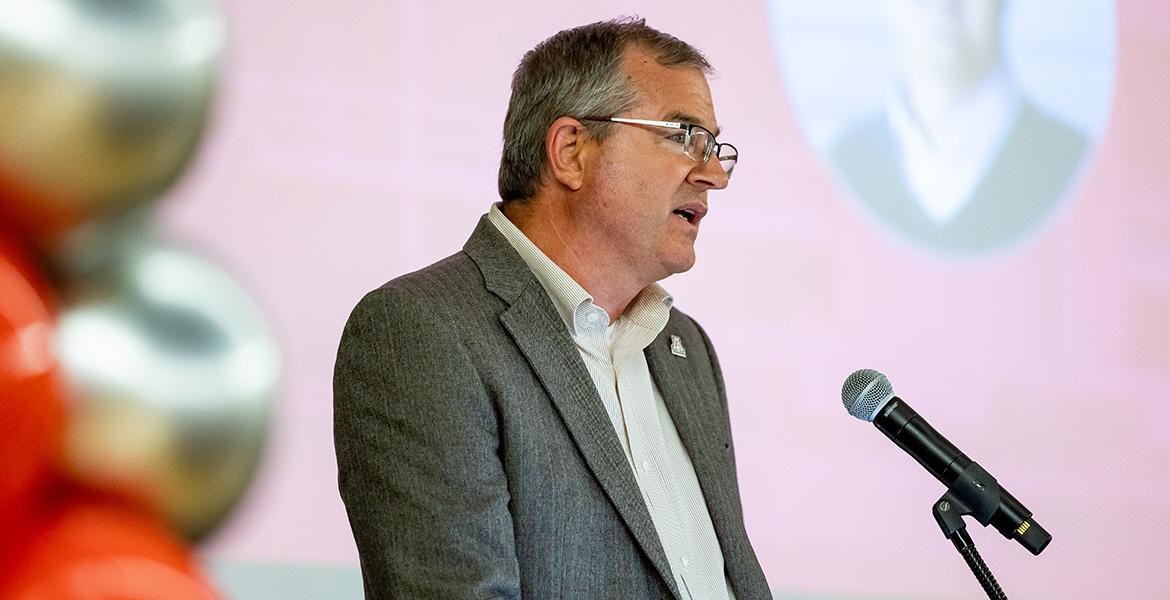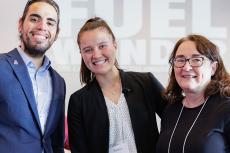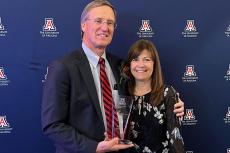College Supporters Pay it Forward at the 2024 Scholarship Reception
The 2024 scholarship reception began with current and former engineering Wildcats sharing laughs as they competed to correctly answer a quiz regarding the University of Arizona College of Engineering’s exciting developments, such as the newest undergraduate degree program, computer science and engineering.
“With the support of scholarships backing their efforts, our undergraduates have many opportunities to experience hands-on learning and conduct research with their professors,” said David W. Hahn, the Craig M. Berge Dean of the college. “They graduate well-prepared to find solutions to engineering problems, and we are very proud of their successes.”
Angel Hernandez, a biomedical engineering senior, was one of more than 500 undergraduate students supported with a donor-funded college scholarship this year. Hernandez expressed gratitude for receiving the Tulsi Memorial Scholarship during his speech.
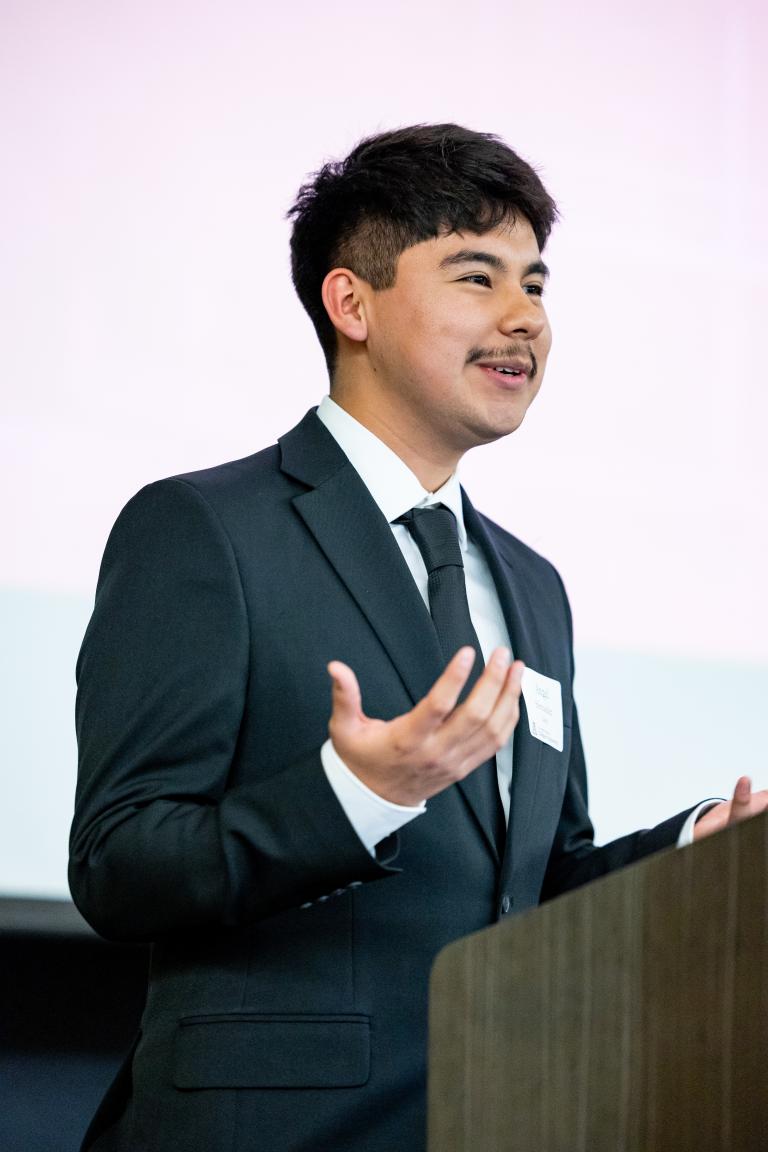
Hernandez is a first-generation Latino student with a passion for neuro-engineering – a novel field of research that combines the disciplines of neuroscience and engineering.
To prepare for a future career in neuro-engineering, Hernandez chose to major in biomedical engineering. Hernandez explained, “Biomedical engineering will help give me those technical and research skills I need for graduate school.”
Hernandez will follow his passion to a biomedical science doctoral program after graduation. And like many of the other undergraduates at the reception, Hernandez shines inside and outside the classroom.
“These financial awards have not only met my concerns of homelessness or lack of food, but they also gave me significantly more time to get involved in research and discover my second passion – assisting others and mentoring undergraduates like me who are underrepresented in STEM,” Hernandez said.
Philanthropic scholarships provide essential support to talented students, including those historically underrepresented in engineering. Donors like Travis McCarthy pay it forward to the next generation of Wildcat engineers with gifts of financial aid and perspective gained from industry experience.
McCarthy, a 1998 civil engineering graduate, spoke on behalf of the Henry George Mackintosh Foundation. The HGM Foundation was established by the family of McCarthy’s wife, Shannon McCarthy, in honor of Henry and Frances Mackintosh to further their belief in the value of education. The Mackintosh Family Engineering Scholarship is an endowed scholarship that supports civil engineering undergraduates who focus on construction engineering management.
McCarthy said his UA Engineering education set a strong foundation for his career successes. He started at Sundt Construction right after graduation and is still with the company’s transportation group in the role of senior vice president and Southwest regional manager.
The HGM Foundation and McCarthy are key supporters of the construction engineering management undergraduate emphasis in the Department of Civil and Architectural Engineering and Mechanics. The dedicated Wildcat has given back to the CAEM department in more ways than financial, providing essential industry knowledge to students and volunteering at alumni events. He asked the scholarship awardees to consider doing the same.
“Upon graduation, stay connected to the university and the college – maybe initially it’s staying in touch with a professor or doing a class talk,” McCarthy encouraged. “When the time is right, consider giving back financially. Remember the gift you are getting here tonight and look to pay it forward.”
Fellowships Fuel Graduate Talent
Promisingly, the future of engineering is not limited to exceptional undergraduate students. Fellowships support graduate students who help position the college as an impressive research organization.
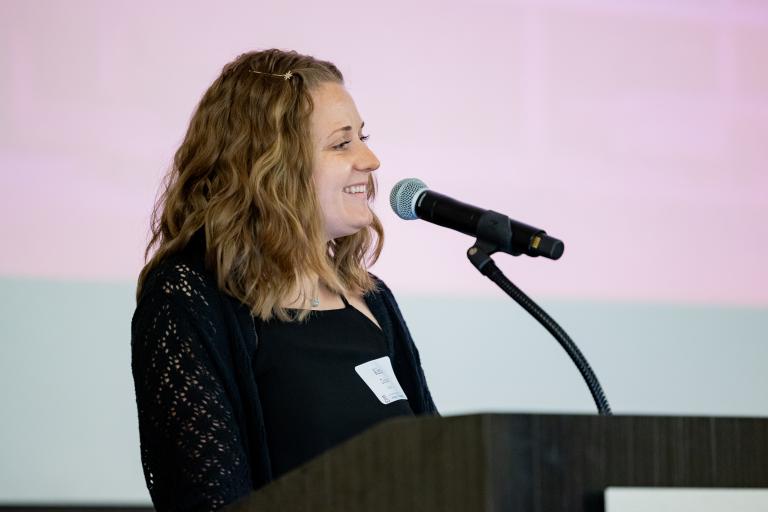
Kira Zeider, a fourth year chemical engineering doctoral student, received the Thomas G. Chapman Memorial Fellowship for her trailblazing research on aerosol-cloud-meteorology interactions and impacts on mining communities.
“In recent years, we’ve sought to grow support for our graduate students, whose work is so important to our research mission,” Hahn said. “The students who have chosen to pursue a graduate degree are taking on the greatest challenges of our time.”
Zeider said her journey to the PhD program had many bumps in the road. After she graduated with bachelor's degrees in both chemical and environmental engineering, the coronavirus pandemic halted her career plans.
It wasn’t until CHEE professor Armin Sorooshian offered her a graduate research position that she considered continuing her education.
“It made me think about all the opportunities it would open up,” she said. “I had always enjoyed working with students, and pursuing a PhD meant that one day I could become a university professor.”
Zeider harnessed the opportunity to dive into environmental research, which included a project that focused on the water and soil quality of communities living near mines.
“The unique and inspiring aspect of community engaged work means the community members are the ones driving the project,” she said.
Zeider said projects like these have opened doors for her in government and national lab work.
“Four years ago, I felt hopeless and without direction,” Zeider said. “Today I am full of hope, and a huge reason why is because of the scholarships I received during my time at the U of A.”


